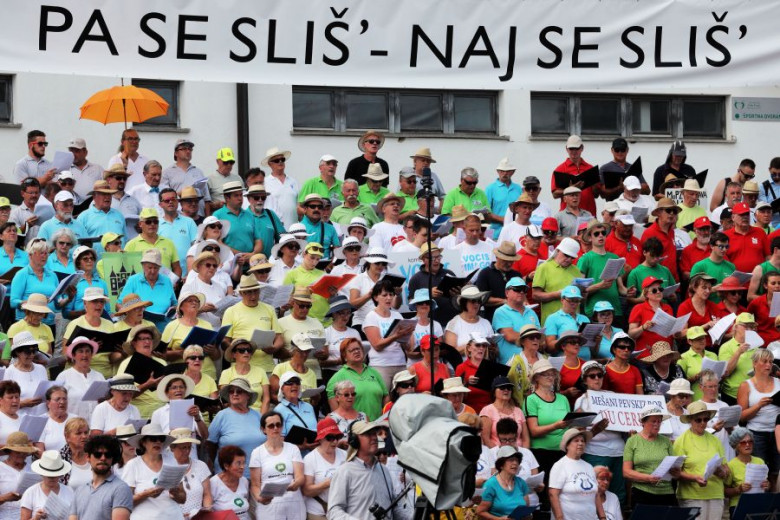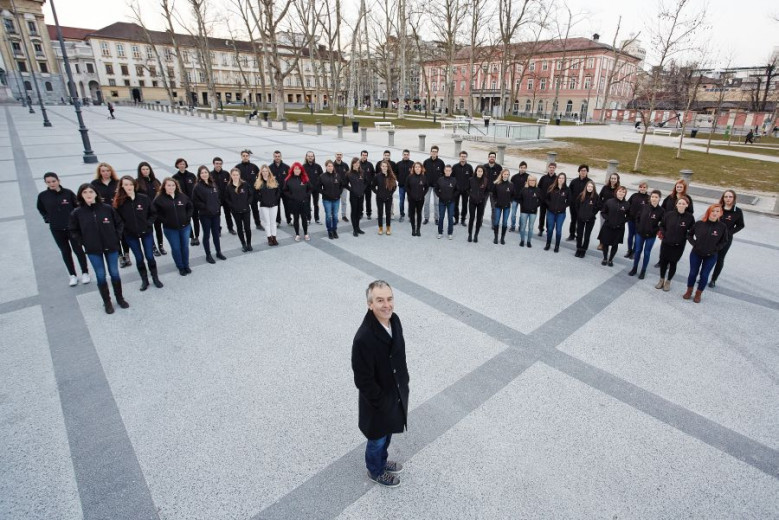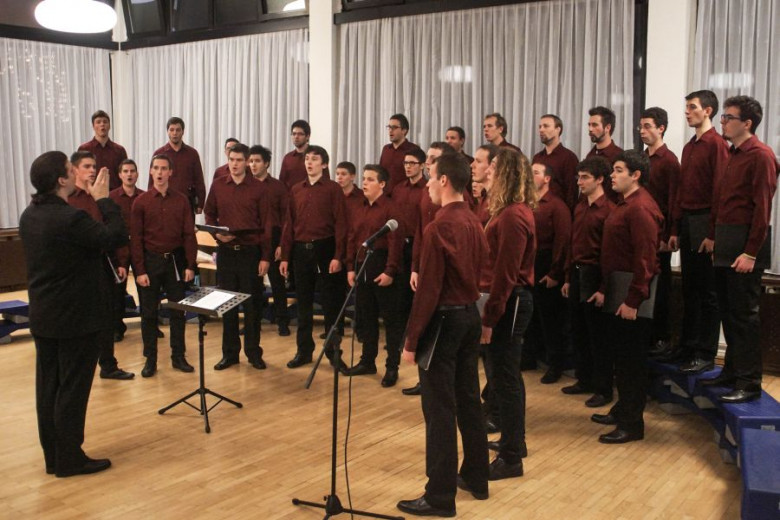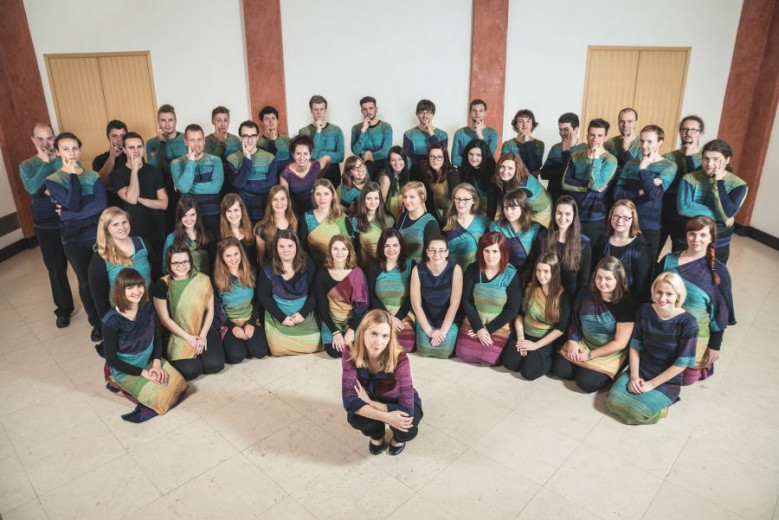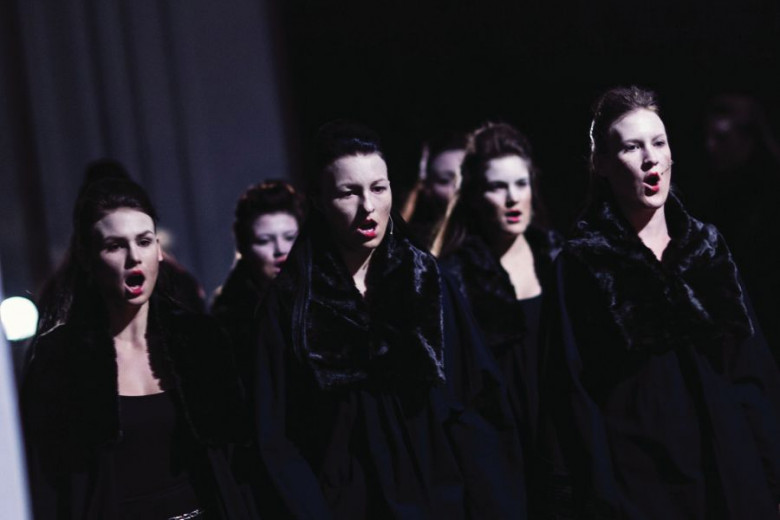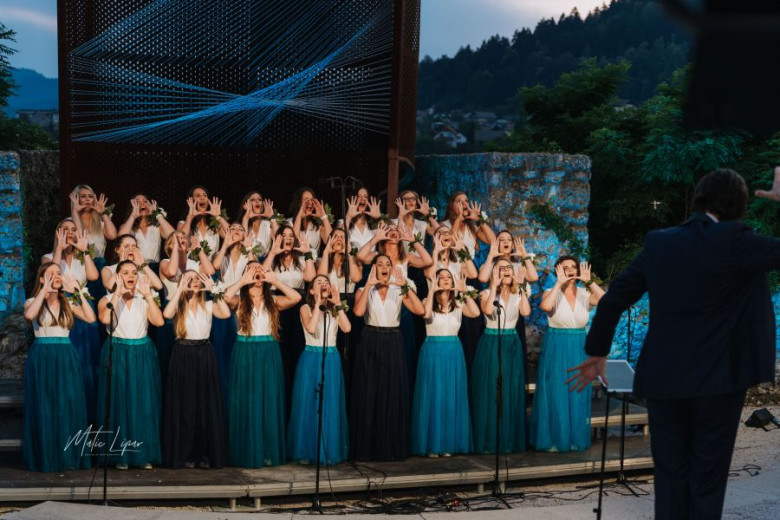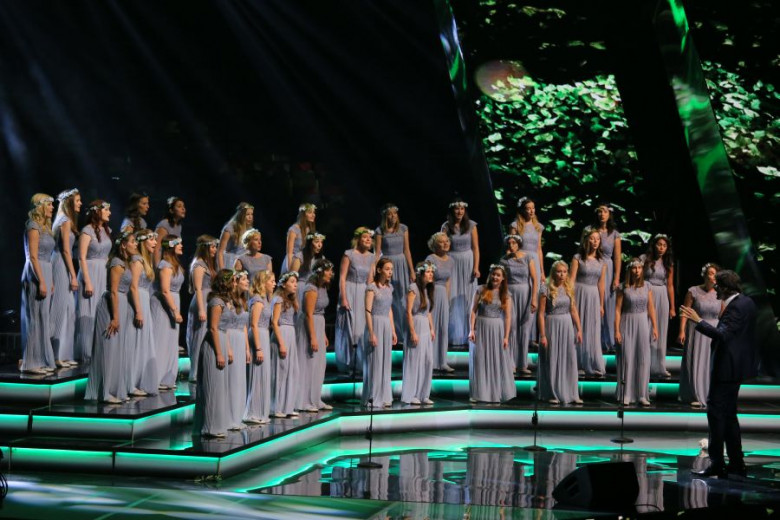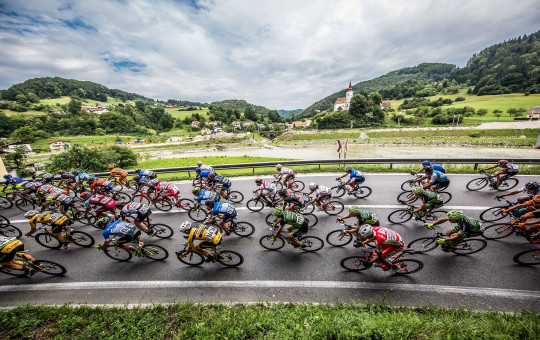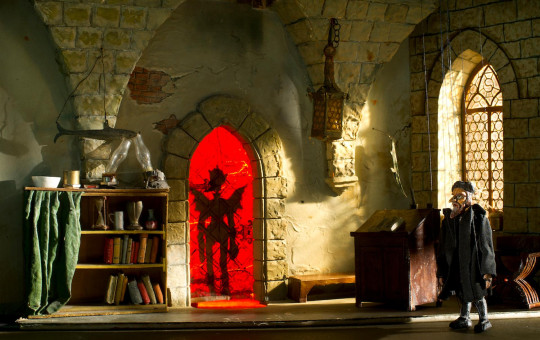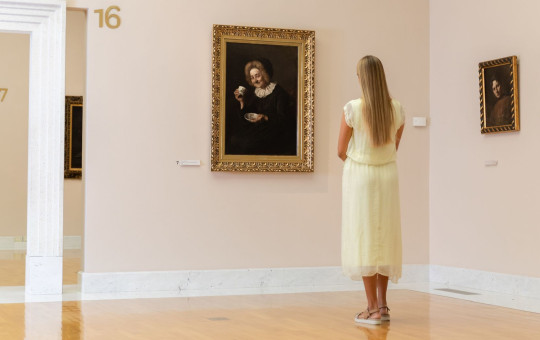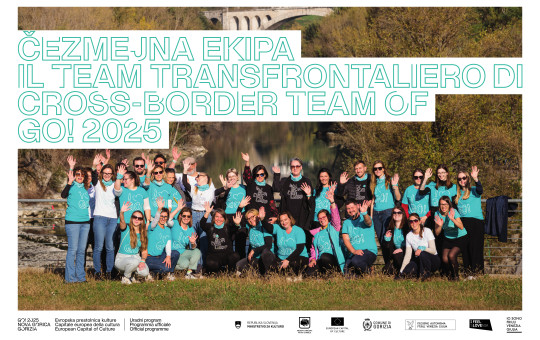Slovenians love singing together so much that there is a saying "Three Slovenians – a Choir". Three singers are enough for the polyphonic singing so typical of Slovenians.
Choral music is the most widespread amateur activity in Slovenia, involving 64,000 singers or more than 3% of the population.
Slovenian choral singing has a rich tradition and its roots date back to 1498 when Jurij Slatkonja, a Viennese bishop of Slovenian descent, as well as a conductor and composer, founded the chapel boys' choir, later known as the Vienna Boys’ Choir.
The first Slovenian songbook and book of the Catechism by protestant reformer Primož Trubar from 1550 is also important for Slovenian choral singing, as well as the creations of the Renaissance composer Iacobus Gallus Carniolus, author of numerous motets (polyphonic vocal music form with a religious text).
His greatest work is the "Opus muzicum" – a collection of 374 motets, which is intended for everyday singing in churches. The Spring of Nations made its mark as well, after which the first Slovenian choirs and beautiful choral songs arose, and which penetrated the international scene in the first half of the 20th century.
Singing and socialising in singing groups has strengthened the Slovenian nation and provided the preservation of language and culture. The period after World War II was also in favour of choral singing. Today, Slovenian choirs delight both at home and abroad, and achieve great success at international competitions.
Choral singing festivals
Quality choral competitions contribute to the growth of choral singing. Slovenia prides itself in the organization of the International Youth Choir Festival in Celje, which alternates every second year with the children's and youth's choir competition at the national level in Zagorje ob Savi, and the International Choral Competition Maribor, which alternates every second year with the competition of Slovenian choirs Naša pesem (Our song). Festival Sredi zvezd (Among the stars) has been held since 2003 and it is dedicated to singing groups of pop-jazz vocal music.
The Camp of Slovenian choirs in Šentvid near Stična, attended by choirs from all over Slovenia, as well as Slovenian minority choirs and choirs from abroad, has the longest tradition of mass choral singing.
The sounds of the Potujoča muzika (Travelling music) concert will be heard once more this year. The Potujoča muzika (Travelling Music) concert is held every year, where about 500 young singers from all Slovenian regions premiere new compositions by Slovenian composers.
Successful at home and abroad
At the annual choral competition European Grand Prix for Choral Singing (GPE), Slovenian choirs have repeatedly enthused and set milestones.
Slovenia was the first country that had three representatives among the five finalists in the Bulgarian city of Varna in 2010, and it was then that the Slovenian choir Vocal Academy of Ljubljana – VAL won under the lead of conductor Stojan Kuret, the only conductor who has won the award twice and the only one who has won it with two distinct groups (in 2002, with APZ Tone Tomšič of the University of Ljubljana).
Vocal Academy of Ljubljana, consisting of sixteen to twenty experienced choral singers from all over Slovenia, is also the first male choir in the history of the competition, which was awarded the Grand Prix of Europe. Vocal Academy of Ljubljana was awarded the prestigious Guidoneum Award 2011 for outstanding achievements and contributions to the development of worldwide choral music in September 2011 in Arezzo, Italy.
APZ Tone Tomšič of the University of Ljubljana
Slovenia shone in the European Grand Prix for Choral Singing competition in 2008, as APZ Tone Tomšič of the University of Ljubljana won the prize for the second time, then under the lead of conductor Urša Lah. The choir, led today by Jerica Bukovec, brings together female and male university students from all faculties of the University of Ljubljana, which share great love for singing and the desire for superior creations.
The roots of the choir date back to 1926 and since its origin, the choir has been considered among the most important catalysts of Slovenian choral singing, not only from the performing-technical side, but also by its programming orientation, as the choir's particular attention is paid to contemporary choral literature.
With the help of commissions and competitions, the choir encourages the formation of new compositions by young people as well as already established Slovenian composers and with their first performances increased the recognisability of Slovenian choral creativity at home and abroad.
The choir confirms its excellence with resounding performances and prestigious awards at many festivals and in competitions at home and abroad.
Academic choir APZ Tone Tomšič received the highest state decoration in 1996, the Golden Order of Freedom of the Republic of Slovenia, for its achievements and merits at the state level, in 2000 the Plaque of the City of Ljubljana, and in 2003 the Gold Label of the Public Fund for Cultural Activities of the Republic of Slovenia.
Slovenian Chamber Choir
A special place among the choirs is held by the Slovenian Chamber Choir, a professional choir of the Slovenian Philharmonic.
It was founded in 1991 by Mirko Cuderman and is led today by Gregor Klančič. The 40-member choir has a season average of 35 concerts with just as many different programmes. Its focal task is the performance of a cappella songs from various musical periods, mostly in the Vocal season series. The choir collaborates with the Slovenian Philharmonic Orchestra in performing vocal and instrumental works, just as with other domestic and foreign orchestras.
The choir has recorded more than eighty records in the collections of Musica Sacra Slovenica and Slovenian choral music with an anthological selection of Slovenian choir music, both sacral and secular.
Since May 2016, the Slovenian Philharmonic Choir has been a full member of the prestigious European network of professional chamber choirs – TENSO.
Primorska Academic Choir Vinko Vodopivec
The only academic male choir in Slovenia is Primorska Academic Choir Vinko Vodopivec, which was established in 1953 by former students from Primorska in Ljubljana. Members of the choir are very proud of their rich and successful history, which was co-created by a number of renowned conductors (Anton Nanut, Andraž Hauptman, Marko Munih and others).
The choir, which is now led by Jakob Barbo, regularly attends local and foreign competitions. Among recent successes worth mentioning are the gold awards at international competitions in Prague in 2006, Bratislava in 2008, Zadar in 2010 and Varna in 2011. The choir also regularly participates in the national competition Naša pesem (Our song) in Maribor.
The choir was the most successful in 1999 when they won the gold plaquette, and in 2010 they received a silver plaquette and an award for the best male choir.
Obala Koper Mixed Choir
The choir, which comprises male and female singers from Primorska, has been active since 1977. The first artistic director, Mirko Slosar, led the choir for 13 years. His work was continued by Walter Lo Nigro, Ambrož Čopi, Maja Cilenšek, Sebastjan Vrhovnik, and since September 2017 the choir has been led by the established composer Andrej Makor. The choir is dedicated to maintaining excellence in choral singing and spreading choral culture by organising the Koper International Choral Festival, which enriches the culture of Slovenian Istria every two years.
Obala Koper has won a gold plaque at the national choir competition "Naša pesem" (Our Song) twelve times.
The choir has also won a number of top prizes at international competitions, including at the Italian competition "Seghizzi" in 2011, the Dutch "Tonen" in 2006, the competition in Miltenberg, Germany, in 2010, the Spanish Torreviejo in 2013, and "Zlatna Vila" in Bosnia and Herzegovina in 2014, while it ranked first at the competition in Split, Croatia, in 2015, and won the Grand Prix at the Italian competition CorAmare in 2019.
Academic Choir of Maribor
More and more successes are stacking up for the Academic Choir of Maribor. In 2012, the group acquired a new artistic leader, Tadeja Vulc, who brought new methods and approaches to the choir, and especially the energy which connects singers every single moment of the season. "We are developing a close friendship, which gives the group a special energy on stage. It is the emotional connection between the singers that enables us to create music together with the conductor, the written kind, and the one which can be felt by every individual, both on stage and in the audience", say the members of the choir.
This great choral group received a gold award at Naša pesem (Our Song) in 2014 in Maribor, where they were placed in absolute 2nd place and awarded the award for performance of a contemporary song (Epilogue, Tadeja Vulc) and with the recognition for the conductor, who received a special debutante award.
At the International Choral Competition Gallus in Maribor in 2015 they placed 4th in the grand finale and received a special recognition from the Public Fund of the Republic of Slovenia for Cultural Activities for the best Slovenian group of the competition, a special award from the audience and a special recognition of Slovenian conductors for the most original concept and convincing performance at the opening concert. The Academic Choir of Maribor also achieved success in 2019 by winning third place.
Carmina Slovenica
Among the most prominent Slovenian choirs is the Maribor girls' choir Carmina Slovenica, led by Karmina Šilec, an internationally renowned musical artist who has been developing the choregie ("vocal theatre"), a new concept which includes music, movement, acting and other theatrical elements. Carmina Slovenica brought freshness to vocal music, opening new areas for expression, persuasiveness, intensity of experience and communication. Excellent productions are rewarded projects that enthused at important international competitions.
Numerous first places in many choral competitions at home and abroad and other reputable local and international awards prove that the artistic concept of Carmina Slovenica is really original and superior at the global level. According to one of the most prominent musical experts, "the Carmina Slovenica choir masters the world stages from Berlin to San Francisco".
Carmen Manet
The women's choir of former students of the Kranj Gimnazija is led by choirmaster Primož Kerštanj. Carmen Manet regularly participates in choir competitions and is the recipient of numerous awards. The choir has also garnered success and awards at international competitions such as: Riva del Garda (Italy), Petrinja (Croatia), Guangzhou (China), Montreux (Switzerland), Rimini (Italy) and Tuhlje (Croatia).
The 2014 competition in Switzerland in particular was of great importance to Carmen Manet, as in addition to winning the women's choir competition, the choir received top laurels – the Montreux Grand Prix.
The choir members are especially proud of the flattering title they received in 2017. They were given the opportunity to represent Slovenia at the Eurovision Choir of the Year, which is intended for amateur choirs from EBU member states. Nine countries took part in the competition, with Slovenia taking home the overall title.
Carmen Manet impressed the panel of expert judges and became the 2017 Eurovision Choir.
Europa Cantat in Slovenia in 2021
The Europa Cantat International Festival will take place in Ljubljana from 16 to 25 July 2021. Singers, composers, choirmasters, instrumentalists and choir music publishers from all over the world will take part in the eight-day festival. Over 100 main events will be held during the festival, with a diverse accompanying programme. Singing, music, new acquaintances, sharing experiences… yes, we can say that song really connects us.
Date: 14. August 2020
Time to read: 3 min

